C1-c: Drafting and revising a working thesis statement
For many types of writing, you will be able to assert your central idea in a sentence or two. Such a statement, which ordinarily appears in the opening paragraph of your finished essay, is called a thesis.
What makes an effective thesis statement?
A successful thesis statement is a central idea that requires supporting evidence; its scope is appropriate for the assigned length of the essay; and it is focused and specific. A thesis is a promise to readers. It is often one or more of the following:
- your answer to a question you have posed
- the resolution for a problem you have identified
- a statement that announces your position on a debatable topic
Drafting a working thesis
As you explore your topic, you will begin to see possible ways to focus your material. At this point, try to settle on a tentative central idea, or working thesis statement. The more complex your topic, the more your focus may change. As your ideas develop, you’ll need to revisit your working thesis to see if it represents the position you want to take or if it can be supported by the sources of evidence you have accumulated.
You’ll find that the process of answering a question you have posed, resolving a problem you have identified, or taking a position on a debatable topic will focus your thinking and lead you to develop a working thesis. Here, for example, are one student’s efforts to pose a question and draft a working thesis for an essay in his ethics course.
question
Should athletes who enhance their performance through biotechnology be banned from athletic competition?
working thesis
Athletes who boost their performance through biotechnology should be banned from athletic competition.
MORE HELP IN YOUR HANDBOOK
The working thesis offers a useful place to start writing—a way to limit the topic and focus a first draft—but it doesn’t take into consideration the expectations of readers who will ask “Why?” and “So what?” The student has taken a position—athletes who boost their performance through biotechnology should be banned—but he hasn’t answered why these athletes should be banned. To fully answer his own question and to claim something specific in his thesis, he might push his own thinking with the word because.
stronger working thesis
Athletes who boost their performance through steroids should be banned from competition because biotechnology gives athletes an unfair advantage and disrupts the sense of fair play.
Revising a working thesis
As you move to a clearer and more specific position you want to take, you’ll start to see ways to revise your working thesis. You may find that the evidence you collected supports a different thesis; or you may find that your position has changed as you learned more about your topic.
One effective way to revise a working thesis is to put it to the “So what?” test (see the box below). Such questions help you keep audience and purpose—and the expectations of your assignment—in mind as you revise.
Using a problem/strategy approach to revise a working thesis
Revising a working thesis is easier if you have a method or an approach. The following problem/strategy approach is an effective way to evaluate and revise a working thesis, especially if you tend to start out with thesis statements that are too factual, too broad, too narrow, or too vague.
A thesis should require proof or further development through facts and details; it cannot itself be a fact or a description.
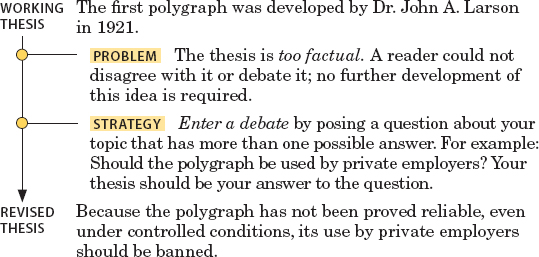
A thesis should be an answer to a question, not a question itself.
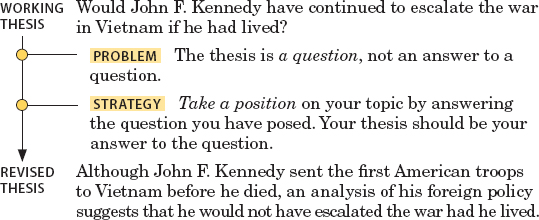
A thesis should be of sufficient scope for your assignment; it should not be too broad.
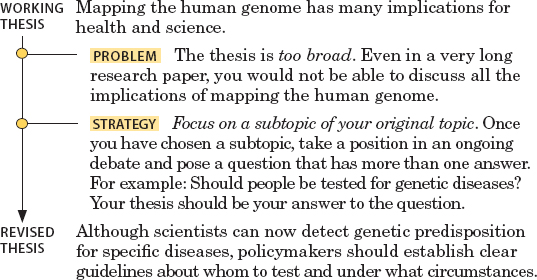
A thesis also should not be too narrow.
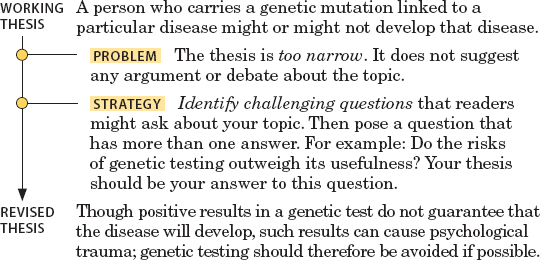
A thesis should be sharply focused, not too vague. Avoid fuzzy, hard-to-define words such as interesting, good, or disgusting.
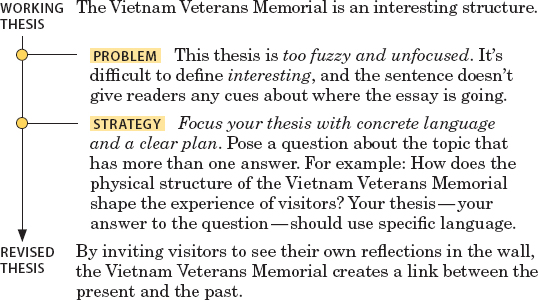
Putting your working thesis to the “So what?” test
Use the following questions to help you revise your working thesis.
- Why would readers want to read an essay with this thesis? How would you respond to a reader who hears your thesis and asks “So what?” or “Why does it matter?”
- Does your thesis answer a question, propose a solution to a problem, or take a position in a debate? Why will readers be interested in your answer, solution, or position?
- Will any readers disagree with this thesis? If so, what might they say?
- Is the thesis too obvious? If you cannot come up with interpretations that oppose your own, consider revising your thesis.
- Can you support your thesis with the evidence available?